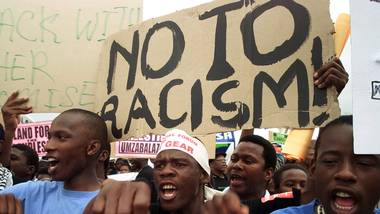 New Delhi (Nepal Foreign Affairs, May 27) : When the immediate neighbors Nepal, Pakistan, Maldives and Sri Lanka have given a reality check on India’s much touted “Neighborhood First” policy, African nations have united against growing “Racism and Afro-phobia” in the Indian society.
New Delhi (Nepal Foreign Affairs, May 27) : When the immediate neighbors Nepal, Pakistan, Maldives and Sri Lanka have given a reality check on India’s much touted “Neighborhood First” policy, African nations have united against growing “Racism and Afro-phobia” in the Indian society.
Unlike expected, Indian Prime Minister Narendra Modi’s “neighborhood first” policy has resulted in bullying and triumphalism in place of the diplomatic conduct with India’s small neighbors. Examples are abundant. In Nepal, driven by the false narrative of “discrimination with Madhesi population,” India wanted to foist a racist constitution. It failed in doing so, and imposed an economic blockade against Nepal.
In Bhutan, India has orchestrated regime changes, supported ethnic cleansing of Nepali speaking minorities in 1990s, and has been able to install pliant governments. Forcefully chased from Bhutan, those minorities lived in Nepal as UN-supported refugees for 20 plus years, and are now being resettled in third countries, mostly in the USA.
In Sri Lanka, India has openly taken the side of Maithripala Sirisena regime, whose election victory has been partially credited to Indian micromanagement. But Sirisena is waking up to Indian expectations, which, in the cloak of resolving Tamil issue, is gradually undermining Sri Lanka’s own national interests. Despite large engagement, India considers Afghanistan no more than a proxy to fight Pakistan.
Long plagued by indecisive mandates in national parliament, India was often blamed of punching below its weight in foreign policy. But Modi’s majority government has forgotten humbleness, diplomacy and principles of engagement in its punching above the weight. Right wing nationalism backed by Hindu religious fanaticism fuels further adventurist tendencies in the government which is gradually trickling down in the behavior of the Indian society at large. Muslims are suffocated, political dissent is criminalized, and religion and the coveted color of skin dominate the social and political discourse. This is why the ambassadors of the African nations in India have aptly asked the big-talking Modi government to find the treatment of Racism in Indian society first. This single statement by the African diplomats, on May 24, has laid bare the hollowness of India’s so-called chest-thumping of being a “largest democracy”.
This adds to India’s most recent diplomatic disaster, triggered by the brutal murder of a 29 year old Congolese student, Masounda Kitada Oliver, last Friday (May 20) in New Delhi. Mind you, disgracing African students and attempts to murder them is not a new phenomenon in India. If you are an African in India, expect racist slurs anytime, anywhere in public.
Physical attacks are common. Here are some representative examples. In September 2014, barely six months of Modi in power; an attack on three young African men by a large mob of Indians in one of New Delhi’s largest metro stations went unheeded by the authorities. “The crowd forced its way into the empty police booth to try to grab the terrified Africans cowering on the roof. They were eventually rescued when a policeman arrived,” wrote Telegraph daily from London, on 1st October 2014. In January this year, a Tanzanian nursing student in Bangalore was publicly stripped and beaten. No police action took place. Some arrests were showcased, failing to produce any “diligent investigation”.
There are many other incidents to prove that Kitada’s murder was an evidence of a deeply racist India, as opposed to the claim of India’s Foreign Minister Sushama Swaraj, who tried to trivialize the incident as something involving “local goons”. No it was not, Madam. It was merely a reflection of an entrenched problem, the Racist India. If you do not believe it, ask your Cabinet colleague Mahesh Sharma, Tourism and Culture Minister, who went to IANS and said “Condemn the killing, but Africa is also not safe.” What an argument in defense of Racism!
What is more shameful is that the Indian media, largely an “image conscious bastard of the British Raj and subsequent Indian elites”, deliberately censures on such incidents. The joint statement of the 54 African heads of Missions in New Delhi was missing in the next day’s newspapers and TV channels. “News” poured in only after the backlash erupted in Congolese capital against Indians. When the government in New Delhi was silent, rather in the mode of denial, the reaction in the streets of Congo was a natural response towards Racism.
Demanding action and investigation in every incident of attack and murder of the African students, The Group of African Heads of Mission announced through the statement on Tuesday that the African nations would boycott the Africa Day event since the community was mourning Oliver’s death. The African group has also warned to tell their governments to not send students to India in view of the climate of growing fear and insecurity.
How long will it take India to liberate itself from Racism? The world is asking.

